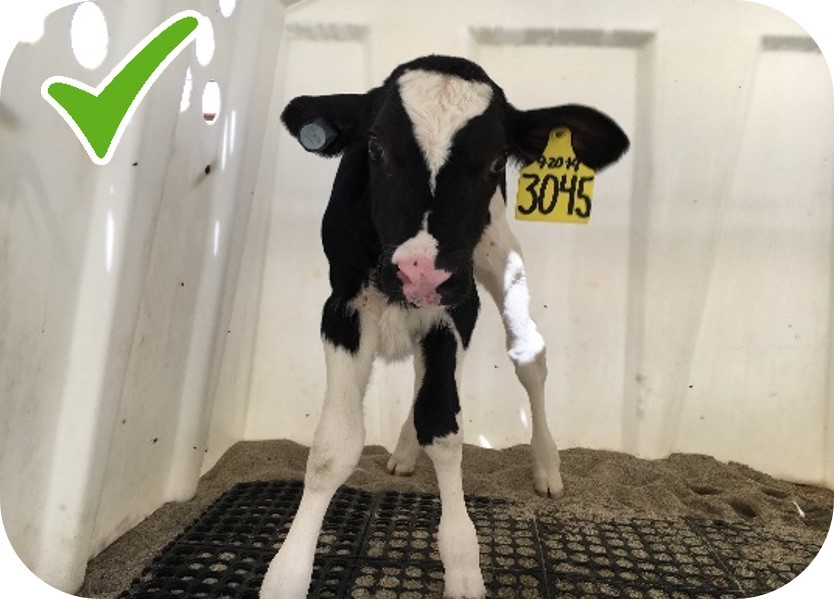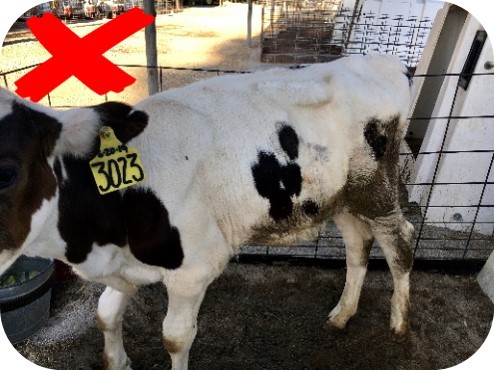Key Considerations for Calf Care
Alycia Drwencke, Dairy Management Specialist
Southwest New York Dairy, Livestock and Field Crops Program
Calf care is one of the most important areas on the farm, but it can also be difficult to prioritize. Particularly, when you consider the labor and financial investment calves can be. However, early life care can influence rate of gain, post weaning health and mortality, reproductive success, milk production, and cull rate. While there are many ways to optimize calf care on the farm, this article will cover just a few of those.
First is providing water for your calves. According to the National Milk FARM Program 4.0, calves 3 days and older must be offered water. While this may be frustrating, there are many benefits to providing young animals water, particularly free-choice water. Research shows that providing free-choice water promotes metabolic function, rumen development, starter intake, average daily gain, and digestion. Calves do not receive adequate water from milk or milk replacer, which can lead to dehydration and negative health effects, strengthening the importance of providing access to water. Keep in mind when you offer water, it should be clean and ideally separate from feed to help keep it clean.
Another important consideration for calves is their bedding. Calves are born with only 2-4% body fat, making them extremely susceptible to weather conditions. Properly bedding can help calves stay warm, dry, and healthy. It is important to select soft material and keep it clean and dry. These materials can include sand, straw, newspaper, rice hulls, shavings, and others. While rocks have been used on some farms for drainage, this is not ideal, as calves lose heat to the rocks, and they can create lesions or injuries. Depending on the season, you may choose to change your bedding material or the frequency of cleaning/adding materials. One way to determine if you current bedding management is working is by using the "knee test." Simply drop to your knees for a minute or two in the calf's pen. When you stand up, if your knees are cold, sore, wet, or dirty, you likely need to add more bedding. You can also evaluate the calves knees and hocks to make sure they are clean, dry, and free of scabs, wounds or missing hair.
Finally, ventilation should be considered for calves year round. The rate of air exchange per hour within a barn should vary throughout the year to be 4 in Winter, 10-20 in Spring and Fall, and 200 during Summer. What that means, is all of the air in your barn should completely turn over 4 times every hour in the Winter. However, calves should not experience wind speeds greater than 60 feet per minute in the Winter. Proper ventilation can help decrease dust build up, moisture, pathogens, risk of pneumonia, and other respiratory disease. While calf care can be difficult to prioritize at times, it is essential to the productivity of your farm and can increase profitability. For additional considerations on calf care, you can contact Alycia Drwencke, Dairy Management Specialist, at 517-416-0386 or amd453@cornell.edu.


Photos courtesy of Blair Downey. The calf on the top has clean, uninjured knees and hocks, supporting that her bedding is clean and dry. The calf in the bottom picture has visibly wet bedding, which is also noticeable when looking at the flank, hocks, and knees of this calf. These areas look both wet and dirty, indicating the need for more clean material.
Upcoming Events
WNY Pastureland Conversion & Soil Health Field Day
July 16, 2025
Middleport, NY
Join American Farmland Trust for the Western New York Soil Health Field Day on July 16, 2025, at Zeliff Farm in Middleport, NY, from 9:00 AM-3:15 PM. Learn about pasture conversion, soil health benchmarking, biochar in grazing systems, and best grazing practices. Plus, enjoy hands-on demos with the NY Soil Health Trailer, drones, and cover crops! Check out the attached agenda for more information about the field day and REGISTER HERE. Zeliff Farms is a regenerative beef operation who has recently partnered with AFT on outreach and education to farmers including learning circles and evaluating biochar effects on soil health.
IPM Strategies to Protect Corn and Soybean Seed in NY
July 30, 2025
Hamburg , NY
SWNYDLFC and Cornell IPM are hosting a grower meeting to discuss integrated pest management strategies for protecting corn and soybean seed in New York.
FAMACHA Training for Sheep and Goat producers in Woodhull NY
August 13, 2025 : FAMACHA Training in Woodhull
Woodhull, NY
Join us for a discussion and hands-on training for internal parasite integrated pest management in sheep and goats. Certification is available to all students participating in the workshop.
Announcements
No announcements at this time.





